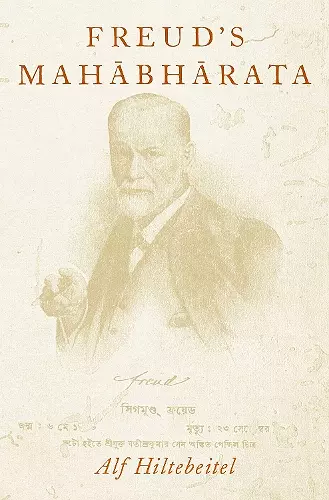Freud's Mahābhārata
Format:Hardback
Publisher:Oxford University Press Inc
Published:27th Sep '18
Currently unavailable, and unfortunately no date known when it will be back

Though Freud never overtly refers to the Mahābhārata, many of the Sanskrit epic's themes are illuminated by Freud's thought and, conversely, many incidents in the epic can be used to illustrate Freud's theories. In Freud's Mahābhārata, the companion volume to Freud's India, Alf Hiltebeitel offers what he calls a "pointillist introduction" to a new theory about the Mahābhārata based on Freud. Chapter 1 introduces the concept of the preoedipal, along with Freud's discussion of burial alive, ghosts and doubles, and castration anxiety, and looks at parallels with Indian theories of karma and reincarnation. In Chapter 2 Hiltebeitel draws on André Green's concept of "the dead mother," alive but dead to her child, to tell the epic's main story through the interactions between the peace-loving King Yudhisthira and his bellicose mother Kunti. Chapter 3 takes up three "dead mother" stories in the Mahābhārata's early books, all of them featuring Kunti, among a plethora of really dead or divine past mothers in the Pandava lineage. Next, Chapter 4 looks at Fernando Wulff Alonso's hypothesis that the Mahābhārata poets worked from Greek sources in modeling their stories. Hiltebeitel explores the epic's divine plan of the unburdening of the Earth, the goddess Earth, and its Greek counterpart in the Iliad's plan of Zeus. Girindrasekhar Bose's concept of the "Oedipus mother" is introduced in Chapter 5 through a discussion of Aravan, a minor figure throughout the Sanskrit epic tradition but one who looms in importance in the Draupadi cult and has a cult of his own, where he is called Kuttantavar. In both cults Aravan is worshiped for his self-mutilating sacrifice as a battle-opening offering to "mother" Kali, and he is worshipped in his own cult by Indian eunuchs or castrati called Aravanis in his honor. The book concludes with a new theory of the epic based on Freud's Moses and Monotheism, in which he argued that religious traditions deserve to be studied not only in what they say consciously about themselves, but in what they have registered unconsciously from past traumas, loss of memory, and the return of the repressed.
This volume, with its companion, will be of high interest to students of religion, psychoanalysis, and psychology, as well as those interested in comparative literature ... Recommended. * M. Uebel, CHOICE *
Alf Hiltebeitel's scholarship on the Sanskrit epic Mahabharata and its living presence in Tamil-speaking communities in South India has shaped the field of Mahabharata studies for a generation, and his latest offering expands the scope of his oeuvre even further. * Journal of Religion *
Spectacularly impressive. You can dip into these amazing volumes and find all manner of marvelous things--not only the valuable information about Freud, Bose, goddesses, and the Mahābhārata, but Hiltebeitel's highly creative ideas about them. * Wendy Doniger, Mircea Eliade Distinguished Service Professor of the History of Religions, University of Chicago *
These volumes comprise the magnum opus of a distinguished historian of religions. It lovingly orbits around two cultural oeuvres of roughly the same length: the great Hindu epic of the Mahābhārata and the Collected Works of Sigmund Freud. It is as if Hiltebeitel has treated the Mahābhārata as one immense psychoanalytic exploration of the maternal polytheisms of Indian Hindu culture and the Collected Works as an unintended but appropriate mythology of Western civilization and its male monotheisms. Behind this astonishing comparison haunts the question: 'Can psychoanalytic methods work in different ontological structures? Can they work here, for example, in the panpsychic nondualism of the Bengali founder of Indian psychoanalysis Girindrasekhar Bose?' The answer appears to be: 'Yes, they can, uncannily so. And the analysis goes both ways.' * Jeffrey J. Kripal, author of Secret Body: Erotic and Esoteric Currents in the History of Religions *
At a time when scholarship in both religion and psychoanalysis seeks to recover a repressed or marginalized anti-colonial past, Hiltebeitel's manuscript offers a wealth of information which scholars of both religion and psychoanalysis will find fascinating and stimulating. This is the kind of research that stimulates more research. * Marshall Alcorn, author of Resistance to Learning *
ISBN: 9780190878337
Dimensions: 239mm x 160mm x 28mm
Weight: 599g
328 pages